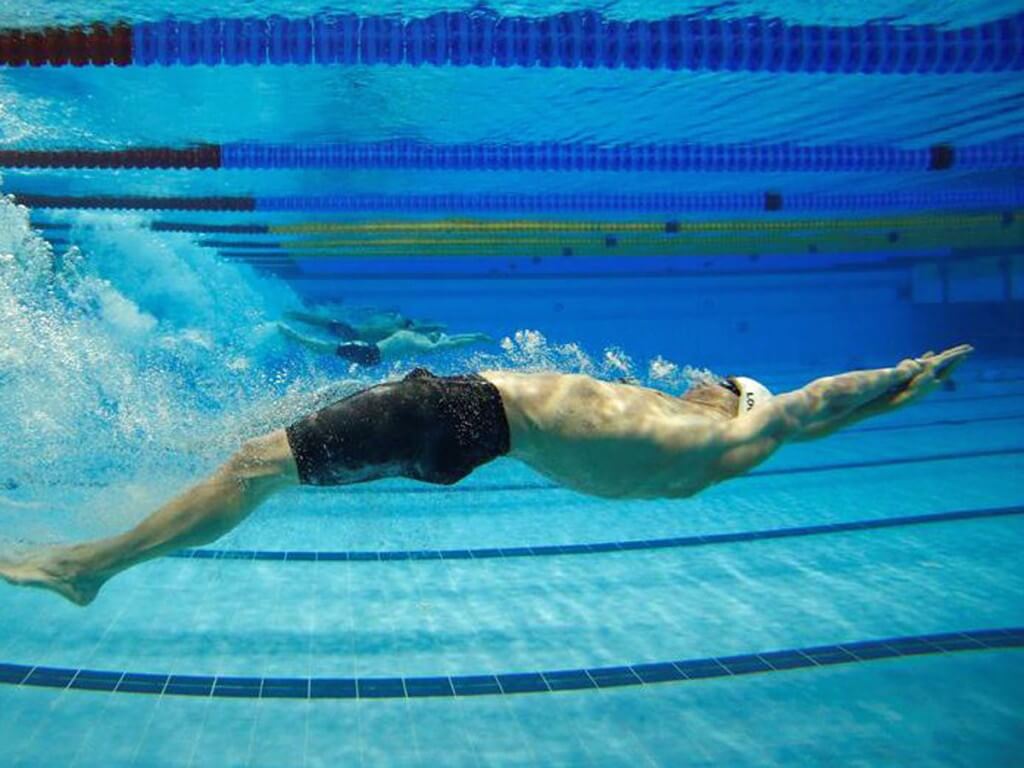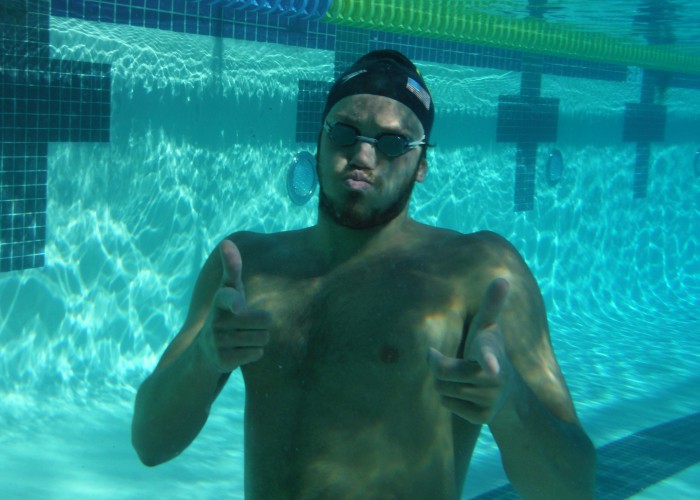5 Ways to Get Over Your Fear of Underwaters

By Annie Grevers, Swimming World Staff Writer
If you’re anything like 98 percent of the swimming population, you tip your head back in dismay when your coach says “16 25s ALL underwater.” But underwaters do not have to be such a fearsome thing. Many of your frustrations grow from your mental approach to underwaters. Perhaps if we call them “mermaids” or “mermen” they’d be more fun? Nah. Then you’d just start holding mermaids and mermen in contempt.
So here are a few things to think about when you feel like you’re about to swallow your tongue because your lungs are so desperate for air…
1. Have landmarks…or uh, underwater marks.
Underwaters give you the opportunity to get even more intimate with those tiles on the bottom of the pool. You start to notice cracks in the tiny tiles that make up the T at the end of the lane. You see the same hair ball and begin to guess who the bulk of those hairs belong to. Rather than giving in to your mind’s first nudge that you need air, look for a specific mark in the pool. Maybe you have just started attempting to make it all the way across the pool. Find something on the bottom of the pool, maybe a grate or a hair tie down there that can be your temporary finish line. Make it a personal challenge to surpass that mark next time.
2. Chill out!
So many swimmers begin hyperventilating before they even push off for an underwater 25. It’s like test anxiety, making you sweat before the paper is placed in front of you. Watch any of the best swimmers as they do their 10 underwater dolphin kicks in a race. Their faces aren’t contorted into a hundred lines of anguish. No, they’re calm, almost placid, because they’re so comfortable staying underwater. And they have learned that squeezing every muscle in your body (facial muscles included) is a waste of energy. As you’re searching of ways to keep your mind off your ever-shrinking lungs, mentally scan your body head to toe to insure you’re staying relaxed; engaging only the muscles necessary (core, quads, hamstrings, feet).
3. Redefine Your Streamline
Swimmers get a little loose with their definition of “streamline” during underwaters– inserting a few sculls, some nods of the head, flared out elbows, a breaststroke pull under the flags. We’re all guilty. Did you know the number one killer of momentum is a sloppy line?! The moment you decide to check your distance from the wall by looking up is the moment you’ll feel a complete loss in momentum and decide “this is probably a good place to take a breath.” Fight the urge to look up. As you near the end of the length, attempt to hold an even tighter streamline to rocket you through those last five yards.
4. Uncork the Core
Sorry, you cannot get away with becoming a strong underwater dolphin kicker without a strong core. Simply oscillating your shins up and down will move you, but not quickly and not efficiently. In the whip-like dolphin kick, there needs to be a strong hold for a strong return. If your upper body (fingertips, shoulders, core) are not firm, your power has no tension and no direction. Check out Lenny Krayzelburg and Michael Phelps’ underwater dolphins:
Very different styles, but both swimmers keep their power directed to the opposite end of the pool. If you do not know how to engage your lowest abdominal muscles to tilt your pelvis forward, you need to learn this integral part of swimming! Doing some flutter kicks on your back or other lower abdominal exercises prior to getting in the pool will activate that muscle group and make you hyper-aware of what needs to be put to work. There’s no getting out of acquiring a strong core if you want to be better at underwaters. Count your kicks and see if, as you become more proficient in using your core, you’re able to deduct some kicks to make it across the pool.
5. Distract Yourself
When your mind is under siege and you feel like underwaters are the last thing in the world you want to be doing, play a game. My team used to play the “name that song” game– those better at underwaters would hum a song during the 25 and those of us on the struggle bus would try to guess the song at the end of the length. This made the underwaters more challenging for those who never seemed to get winded, and more entertaining for those of us who were more hypoxically challenged.
Hold your breath. Keep calm. Kick on.
*DISCLAIMER: Always, always, always be smart about under waters. In a race, we are not allowed to stay underwater beyond 15 yards/meters, so attempting to stay under for two to four lengths is never endorsed. If performing underwater 25s, swimmers should be under careful supervision of a coach and also not push themselves to an unsafe limit. Like everything in our sport, progress in breath control comes gradually, so taking baby steps in this realm is very important. Ultimately, the purpose of underwaters is to gain the confidence and hypoxic stamina needed to stay under and carry momentum off the final wall of a race.





Brittany Archer
Sabrina Martínez
Susanna Schumann Kyle Moore
OH gosh I hate underwaters ?
This is a great wake up call for most swimmers.?
Yazid Shalaby
Molly Peterson. Read this! ??????
Derek J. Gelber is this what you mean?
Ha! Yes
Ok we’ll have to start
OK…I’ve always been the weird one. . .I LOVE underwaters!!
You would think that after all the concern for underwater black-outs that this post would not take place. I happen to love underwaters. I also have passed out doing them. I have had swimmers pass out doing them. I don’t do them anymore.
Coaches who ask swimmers to do this are putting them at risk for something very dangerous. Swimmers should be cautious about doing them and understand the limits they should go through.
Doing underwaters, in and of themselves, does nothing to physiologically improve a swimmer’s ability to do underwaters. Maybe mentally – but not physically.
If you read this and say “hogwash” just ask yourself – do you want to take the chance that you or, if you are a coach, your swimmer will pass out and die. It is not worth the risk – not for anything.
great write up, Annie.
Kieran Trump
Underwaters are great.
Hum a song. I like it.
Nitin Dharam Rhema John Samuel Charu Rawat We are going to try this next time 🙂
Alexander Görzen
Zoe McIlmurray
Best way air pluc…
My daughter suffered shallow water blackout! I don’t think there’s any good way of holding you breath. All i see is danger!!
I need this ?? Esther
Robbert Donk over je nieuwe hobby
you dont play & chill under water … you’re not a swimmer